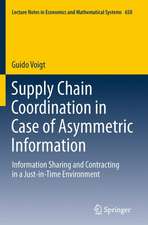General Equilibrium with Price-Making Firms: Lecture Notes in Economics and Mathematical Systems, cartea 91
Autor T. Marschak, R. Seltenen Limba Engleză Paperback – 15 feb 1974
Din seria Lecture Notes in Economics and Mathematical Systems
-
 Preț: 360.02 lei
Preț: 360.02 lei -
 Preț: 279.18 lei
Preț: 279.18 lei -
 Preț: 369.52 lei
Preț: 369.52 lei -
 Preț: 369.67 lei
Preț: 369.67 lei -
 Preț: 365.80 lei
Preț: 365.80 lei -
 Preț: 429.47 lei
Preț: 429.47 lei -
 Preț: 478.64 lei
Preț: 478.64 lei -
 Preț: 366.53 lei
Preț: 366.53 lei -
 Preț: 370.41 lei
Preț: 370.41 lei -
 Preț: 364.12 lei
Preț: 364.12 lei -
 Preț: 384.66 lei
Preț: 384.66 lei - 20%
 Preț: 347.35 lei
Preț: 347.35 lei - 15%
 Preț: 618.84 lei
Preț: 618.84 lei -
 Preț: 364.85 lei
Preț: 364.85 lei -
 Preț: 404.74 lei
Preț: 404.74 lei -
 Preț: 371.14 lei
Preț: 371.14 lei - 15%
 Preț: 620.12 lei
Preț: 620.12 lei -
 Preț: 364.85 lei
Preț: 364.85 lei -
 Preț: 332.55 lei
Preț: 332.55 lei -
 Preț: 409.77 lei
Preț: 409.77 lei -
 Preț: 364.12 lei
Preț: 364.12 lei - 18%
 Preț: 746.28 lei
Preț: 746.28 lei -
 Preț: 377.83 lei
Preț: 377.83 lei -
 Preț: 386.54 lei
Preț: 386.54 lei - 15%
 Preț: 621.99 lei
Preț: 621.99 lei -
 Preț: 367.84 lei
Preț: 367.84 lei -
 Preț: 364.12 lei
Preț: 364.12 lei - 15%
 Preț: 613.49 lei
Preț: 613.49 lei - 15%
 Preț: 622.80 lei
Preț: 622.80 lei -
 Preț: 363.56 lei
Preț: 363.56 lei -
 Preț: 430.99 lei
Preț: 430.99 lei - 15%
 Preț: 620.12 lei
Preț: 620.12 lei -
 Preț: 371.51 lei
Preț: 371.51 lei - 15%
 Preț: 629.71 lei
Preț: 629.71 lei -
 Preț: 399.41 lei
Preț: 399.41 lei -
 Preț: 396.06 lei
Preț: 396.06 lei -
 Preț: 383.92 lei
Preț: 383.92 lei -
 Preț: 383.92 lei
Preț: 383.92 lei -
 Preț: 378.00 lei
Preț: 378.00 lei - 15%
 Preț: 611.45 lei
Preț: 611.45 lei - 20%
 Preț: 628.85 lei
Preț: 628.85 lei -
 Preț: 365.59 lei
Preț: 365.59 lei -
 Preț: 476.81 lei
Preț: 476.81 lei -
 Preț: 431.15 lei
Preț: 431.15 lei -
 Preț: 364.49 lei
Preț: 364.49 lei - 15%
 Preț: 613.05 lei
Preț: 613.05 lei -
 Preț: 371.35 lei
Preț: 371.35 lei -
 Preț: 364.33 lei
Preț: 364.33 lei - 15%
 Preț: 641.35 lei
Preț: 641.35 lei
Preț: 373.56 lei
Nou
Puncte Express: 560
Preț estimativ în valută:
71.49€ • 75.42$ • 59.58£
71.49€ • 75.42$ • 59.58£
Carte tipărită la comandă
Livrare economică 02-16 ianuarie 25
Preluare comenzi: 021 569.72.76
Specificații
ISBN-13: 9783540066248
ISBN-10: 3540066241
Pagini: 260
Ilustrații: XI, 247 p.
Dimensiuni: 170 x 244 x 14 mm
Greutate: 0.42 kg
Ediția:Softcover reprint of the original 1st ed. 1974
Editura: Springer Berlin, Heidelberg
Colecția Springer
Seria Lecture Notes in Economics and Mathematical Systems
Locul publicării:Berlin, Heidelberg, Germany
ISBN-10: 3540066241
Pagini: 260
Ilustrații: XI, 247 p.
Dimensiuni: 170 x 244 x 14 mm
Greutate: 0.42 kg
Ediția:Softcover reprint of the original 1st ed. 1974
Editura: Springer Berlin, Heidelberg
Colecția Springer
Seria Lecture Notes in Economics and Mathematical Systems
Locul publicării:Berlin, Heidelberg, Germany
Public țintă
ResearchCuprins
I. Introduction.- Motivation.- Literature.- The present study.- Notational conventions.- II. General Equilibrium with a Monopolistic Sector: Equilibria of Traditional Type.- 1. “True” General Equilibria of Traditional Type.- 2. General Equilibria of Traditional Type When Monopolists Do Not Sell to Each Other.- 3. Monopolists Selling to Each Other.- 4. Concluding Remarks.- List of Assumptions.- III. A New Approach to Monopolistic and Other Noncooperative Equilibria: The Theory of “Convolutions” (Rationality-Preserving Response Functions).- 1. Basic Concepts.- 2. Examples.- 3. A Necessary Condition for Existence of a Convolution.- 4. “Weak” Convolutions and the Sufficiency of the Necessary Conditions.- 5. Other Variants.- 6. Concluding Remarks.- IV. Oligopolistic Economies as Games of Limited Information: Description of Equilibria.- 1. Introduction.- 2. A Small Oligopolistic Economy with Set-Up Costs and Nondecreasing Returns.- 3. A Large Oligopolistic Economy with Each Firm Visualizing a Small Economy: A Concrete Version and an Abstract Generalization.- V. Oligopolistic Economies as Games of Limited Information: Existence of Equilibria.- 1. An Essential Existence Proposition.- 2. Notation and a Mapping Argument for the Basic Existence Proposition.- 3. The Quantities of Goods Required to Produce a Given Final-Good Vector: Existence and Continuity of the Functions g, ?, $${\overline f _W}$$.- 4. Zero-Profit Prices for Intermediate Goods: Existence and Continuity of the Function µ.- 5. The Intersection Point of a ?-Curve and the Offer Surface: Existence and Continuity of the Function $$\ell $$.- 6. Summary: the Basic Existence Theorem.- 7. Implications of the Basic Existence Theorem for the Existence of Oligopolistic General Equilibria.- 8. OtherEquilibria.- 9. A Numerical Example of Oligopolistic General Equilibrium.- VI. Conclusion.- References.














